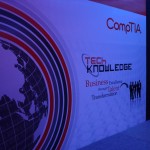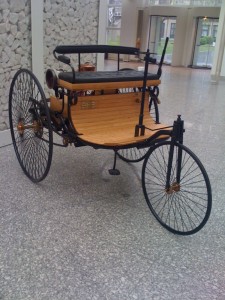As somebody who commutes to London often, and travels overseas occasionally, I am surprised to read about Brain Shot by Random House publishers. This is a product that distills regular books into a 10,000-word, 60-page e-book for people in a rush, on the go and no time to read. For example, John Barrow’s “100 essential things” has been reduced from a 340-page book by 80%. Part of the beauty of books is to learn, get-away-from-it-all and lose yourself in the pages. Is that excused because it has been given the ‘technology effect?’
Is email passé?
 I wonder how long it will take before email is passé. Our youngsters today are less inclined to send email because it is too long a process, and instant messaging is fast and with-it! I hear some unversities have stopped distributing email accounts to their students, and instead are giving out eReaders, iPads and Tablet computers – that’s the kind of place I would like to study.
I wonder how long it will take before email is passé. Our youngsters today are less inclined to send email because it is too long a process, and instant messaging is fast and with-it! I hear some unversities have stopped distributing email accounts to their students, and instead are giving out eReaders, iPads and Tablet computers – that’s the kind of place I would like to study.
Two-Cent Candy
 With technology so powerful, how can we use it to create what Tom Peters calls the “Two-Cent Candy Phenomenon?” Small differentiators, such as a store with a box of two-cent candies at the checkout, or a jar of sweets at the immigration desks at Singapore airport. Small touches that are so memorable. So many ways to add a touch of ‘wow’, how can technology help us by adding ‘small gestures’ to our business?
With technology so powerful, how can we use it to create what Tom Peters calls the “Two-Cent Candy Phenomenon?” Small differentiators, such as a store with a box of two-cent candies at the checkout, or a jar of sweets at the immigration desks at Singapore airport. Small touches that are so memorable. So many ways to add a touch of ‘wow’, how can technology help us by adding ‘small gestures’ to our business?
Teachers
 The students of a very bad teacher will learn, on average, half a year’s worth of material in 1 school year. The students in the class of a very good teacher will learn a one-and-a-half year’s worth of material. That difference amounts to a year’s worth of learning in a single year. Teacher effects dwarf school effects: your child is actually better off in a bad school with an excellent teacher than in an excellent school with a bad teacher. If you rank the countries of the world in terms of the academic performance of their schoolchildren, many countries could climb the ladder simply by replacing the bottom 6-10% of public-school teachers with teachers of average quality (Jack Welch tells us to do this in our companies every year). After years of worrying about issues like school funding levels, class size, and curriculum design, many reformers have come to the conclusion that nothing matters more than finding people with potential to be great teachers. Summarised from Malcolm Gladwell’s excellent new book ‘What the Dog Saw.’
The students of a very bad teacher will learn, on average, half a year’s worth of material in 1 school year. The students in the class of a very good teacher will learn a one-and-a-half year’s worth of material. That difference amounts to a year’s worth of learning in a single year. Teacher effects dwarf school effects: your child is actually better off in a bad school with an excellent teacher than in an excellent school with a bad teacher. If you rank the countries of the world in terms of the academic performance of their schoolchildren, many countries could climb the ladder simply by replacing the bottom 6-10% of public-school teachers with teachers of average quality (Jack Welch tells us to do this in our companies every year). After years of worrying about issues like school funding levels, class size, and curriculum design, many reformers have come to the conclusion that nothing matters more than finding people with potential to be great teachers. Summarised from Malcolm Gladwell’s excellent new book ‘What the Dog Saw.’
Indian Adventure
 Co-hosted three TechKnowledge evening seminars in Bangalore, Chennai and Delhi this week. Whirlwhind tour but well worth it. Hosted more than 180 delegates, where we discussed creating a competitive difference through skills and talent. A common thread is emerging, and when you look at changing demographics, the median ages of key global markets and India’s investment in education, it is poised to become the world’s largest supplier of
Co-hosted three TechKnowledge evening seminars in Bangalore, Chennai and Delhi this week. Whirlwhind tour but well worth it. Hosted more than 180 delegates, where we discussed creating a competitive difference through skills and talent. A common thread is emerging, and when you look at changing demographics, the median ages of key global markets and India’s investment in education, it is poised to become the world’s largest supplier of
well-educated workers. People are our number one asset, and India recognises that.
Things
 Attended a few good events recently; presented at the British Telecom apprentice managers event in Gatwick, Brokerbin’s UK partner meeting in Manchester and the ElementK Learning Practitioners seminar in St Paul’s. Some excellent new contacts through those, and enjoyed them all. By far, this was the best thing I heard: “The best things in life aren’t things.”
Attended a few good events recently; presented at the British Telecom apprentice managers event in Gatwick, Brokerbin’s UK partner meeting in Manchester and the ElementK Learning Practitioners seminar in St Paul’s. Some excellent new contacts through those, and enjoyed them all. By far, this was the best thing I heard: “The best things in life aren’t things.”
India agrees, employee satisfaction first
 With a population of 1.1 billion people, it is reassuring to hear Vineet Nayar, CEO of leading IT services company HCL, place such importance on putting employee satisfaction first. He said, “If an employer doesn’t get it, then individuals will simply go and work for someone else.” I say, the holders of the intellectual assets will wield the most power, yes, those with the skills.
With a population of 1.1 billion people, it is reassuring to hear Vineet Nayar, CEO of leading IT services company HCL, place such importance on putting employee satisfaction first. He said, “If an employer doesn’t get it, then individuals will simply go and work for someone else.” I say, the holders of the intellectual assets will wield the most power, yes, those with the skills.
Our new currency, our ‘stock market’, is made up of human resources. If we don’t have the skills on board, the technology will not work by itself!
Europe’s finest
 Spent a few days in Milan and Stuttgart this week. Discussed the finer details of a partnership in Italy and two evenings of the finest salamis, cheeses and pasta in the heart of Milan. The cathedral (Duomo) is the second largest in the world and simply stunning. Onto to Stuttgart, and an excellent first meet with the CIO of Daimler-Benz. Great conversation and very much on common ground for the improvement of IT skills across Europe – I keep harping on about this, but everyone is interested in skills, to make our people more productive and our companies more competitive. The photo is of one of the earliest Mercedes Benz cars on show at their headquarters.
Spent a few days in Milan and Stuttgart this week. Discussed the finer details of a partnership in Italy and two evenings of the finest salamis, cheeses and pasta in the heart of Milan. The cathedral (Duomo) is the second largest in the world and simply stunning. Onto to Stuttgart, and an excellent first meet with the CIO of Daimler-Benz. Great conversation and very much on common ground for the improvement of IT skills across Europe – I keep harping on about this, but everyone is interested in skills, to make our people more productive and our companies more competitive. The photo is of one of the earliest Mercedes Benz cars on show at their headquarters.
22% of income on education
 Families in South Korea spend 22% of their income on education and 13% on their housing. How many of us in the UK spend an amount each month on educating our families that comes anywhere near what we spend on our mortgage or rent, or even our leisure spend. It is worth thinking about, especially as the skills and talent of our next generation will determine whether a company is successful or not in future. All about the people. Also, most of us focus any spend on education at senior school or university fees – but in Asia, the big spend is on infant education – that’s where they get the greatest benefit and they generate millions of students keen to learn and able to learn (from a Vistage UK event hosted by my old chum Steve Gilroy www.vistage.co.uk).
Families in South Korea spend 22% of their income on education and 13% on their housing. How many of us in the UK spend an amount each month on educating our families that comes anywhere near what we spend on our mortgage or rent, or even our leisure spend. It is worth thinking about, especially as the skills and talent of our next generation will determine whether a company is successful or not in future. All about the people. Also, most of us focus any spend on education at senior school or university fees – but in Asia, the big spend is on infant education – that’s where they get the greatest benefit and they generate millions of students keen to learn and able to learn (from a Vistage UK event hosted by my old chum Steve Gilroy www.vistage.co.uk).


